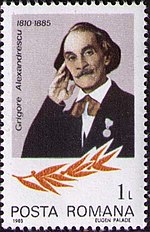Grigore Alexandrescu
Grigore Alexandrescu (born February 22, 1810 in Târgovişte , † November 25, 1885 in Bucharest ) was a Romanian writer , poet and translator who was particularly known for his fables with a political background.
biography
Grigore was born as the fourth child of a treasurer in a suburb of Târgovişte. Since he stood out from an early age with his special intelligence and extraordinary memory, he was promoted, also learned Greek and French, but was orphaned as a child . In 1827 he moved to Bucharest and stayed for a while in the care of an uncle who made it possible for him to continue his education at the “Vaillant School”, which was part of the “Sfântul Sava” college in Bucharest, which was very prestigious in those days. He amazed many with his poetic talent. Alexandrescu was at school a comrade of the later mathematician and politician Ion Ghica and the co-founder of the Romanian Academy ( Academia Română ) Ion Heliade-Rădulescu . The latter, in 1832 his first volume of poetry and elogeny, contained “Miezul nopții” ( midnight ) and the elegy “Adio. La Târgovişte ” should publish in the Curierul Românesc , he was allowed to live for a long time.
Alexandrescu then struck the officer career, but left the army in 1837. Because of his writings "Anul 1840" and "Lebăda și puii corbului" he was even arrested and imprisoned. In 1848 he worked as the editor of the newspaper Poporul suveran . In the same year he joined a Masonic Lodge in Bucharest.
But already at the age of 50 Alexandrescu suddenly fell more and more mentally deranged, could soon no longer write and publish and died completely impoverished. According to one version, the disease is said to have broken out after the poet ate a poisoned jam sent by a former of his numerous lovers.
Numerous streets in Romania have been named after him, not only in the state capital Bucharest and his native Târgovişte, but also in Arad , Cluj and Timişoara , among others .
Literary activity
Grigore Alexandrescu, the translator of works by Alphonse de Lamartine and George Gordon Byron , among others , who also influenced his work, is considered a representative of Romanian Romanticism and a pioneer of Mihai Eminescu . For the period in which he lived he was an innovative poet, eager to propose a new artistic language.
Convinced that God was absent and that man was alone in the world, Grigore became obsessed with the idea of human imperfection as a result. His vacillation between skepticism and resignation creates an impression of modernity.
He expressed the rejection of the Christian solution to the human dilemma and ridiculed the consolations offered by reason as by no means the only possible courses of action in his "Meditații" of 1835.
In his forty-odd fables, he ironically commented on the complications of life in a Russian protectorate - what Wallachia was then - and tried to encourage readers to be proud of their national heritage. His work "Above the Tombs of Drăgășani " was a reminder of the greatness of the Romanian past. He was looking for a point of equilibrium in the world and he seemed to have succeeded in doing so in the clear and realistic analysis of human nature in his “Fabule”.
It is thanks to Alexandrescu that letters, meditation and satire have been anchored as independent literary genres in Romanian literature.
Works (summary)
- Poezii (1832)
- Fabule (1832)
- Meditații (1835)
- Poezii (1838)
- Fabule (1838)
- Poezii (1839)
- Memorial (1842)
- Poezii (1842)
- Suvenire și impresii, epistole și fabule (1847)
- Meditații, elegii, epistole, satire și fabule (1863)
Works for reading (Romanian)
The author's works can be read here:
Below is a small selection from his works.
|
|
|
literature
- Eugen Lovinescu: "Grigore Alexandrescu: Viața și opera lui" , Bucharest 1928.
- Mircea Anghelescu: “Opera lui Gr. Alexandrescu “ , Editura Minerva, Bucharest 1973, 161 pp.
- Keith Hitchins: "Românii, 1774–1866" , Humanitas Publishing House, Bucharest, 2004.
- Academia Republicii Populare Române, Dicționar Enciclopedic Român, Editura Politică, Bucureşti, 1962–1966.
Individual evidence
- ^ Academia Republicii Populare Române, Dicționar Enciclopedic Român / Grigore Alexandrescu, Editura Politică, Bucharest, 1962–1966
- ↑ Alexandrescu at Tratatul de istorie a masoneriei.ro (Romanian)
- ↑ a b Clara Margineanu: "A cugeta mari fapte este povara mea!" At Jurnalul.ro on November 27, 2011 (Romanian)
- ↑ a b Keith Hitchins: "Românii, 1774-1866" , Humanitas Publishing House, Bucharest, 2004, p. 190 f
- ↑ Grigore Alexandrescu at answers.com (English)
- ↑ poems
- ↑ Fables
Web links
| personal data | |
|---|---|
| SURNAME | Alexandrescu, Grigore |
| ALTERNATIVE NAMES | Grigore Alexandrescu (full name) |
| BRIEF DESCRIPTION | Romanian writer and poet |
| DATE OF BIRTH | February 22, 1810 |
| PLACE OF BIRTH | Târgovişte |
| DATE OF DEATH | November 25, 1885 |
| Place of death | Bucharest |


